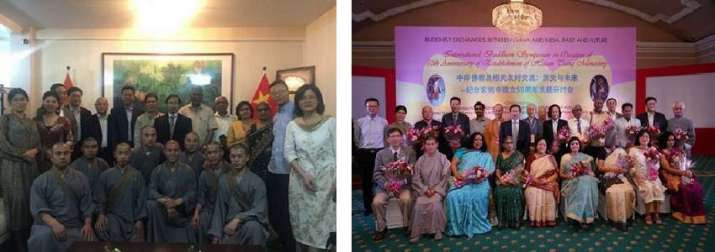By Shyamal Sinha

The Hsuan Tsang Monastery lacked the eternal snow peaks of the Himalayas in its background. Its quiet obvious as the Hsuan Tsang Monastery is not lactated high up in the Himalayas but located in the outskirts of Calcutta (Kolkata).
Located in Paschim Chowbaga of the Tiljala region the Monastery is best approached from the Ruby Hospital on the Eastern Metropolitan Bypass. Regular auto services are available from Ruby to just sort of the Hsuan Tsang Monastery. Alternatively one can get down at the Paschim Chowbaga bus – stop on the Science City – Basanti highway, cross a rickty wooden bridge over a canal and walk for 15 minutes to reach the Hsaun Tsang Monastery, locally called the China Mandir.
Addressing the relation between China and India, Ma, emphasized that there is a long history of friendly exchanges between the two countries that goes all the way back to the ancient times and the development of the Silk Road. Buddhism was brought to China via the Silk Road. And Chinese monks such as Xuanzang and Fa Xian (337-422) used the same route to travel to India and seek further Buddhist knowledge. Some Indian monks also travelled to China and established Buddhist temples such as Lingyin, Shaolin, and others. These mutual exchanges reflect the spirit of the Silk Road, which is based on peace, cooperation, inclusion, openness, mutual learning, and mutual benefit.
In 2013, President Xi Jinping launched the Belt and Road Initiative. And Ma emphasized how the symposium contributed to enhance mutual understanding, which is of the five connectivity components promoted by the Belt and Road Initiative.
On 14 March, the Chinese community in Kolkata, India, celebrated the 50th anniversary of the Hsuan Tsang Monastery. The monastery is named after Xuanzang (602-64), known as Hsuan Tsang in India, a famous Buddhist monk and scholar from China who travelled to India in the seventh century. The monastery was constructed 50 years ago, by the local Chinese community in Kolkata, the capital city of West Bengal.
To mark the anniversary, the Consulate General of People’s Republic of China in Kolkata, in collaboration with Lingyin Temple in Hangzhou, China, and Cheena Bhavan of Visva-Bharati University in Santiniketan, West Bengal, hosted an international symposium on 15 March. The theme of the symposium was “Buddhist Exchanges between China and India: Past and Future”.
Over 200 Chinese and Indian participants, including Ma Zhanwu, Chinese consul general in Kolkata, Master Huirong of Hsuan Tsang Monastery, Master Guangquan, abbot of Lingyin Temple and head of the Chinese Buddhist Association, and many other dignitaries, were present at the symposium.
“I hope the celebrations will enable the Indian people to learn about Hsuan Tsang in a better way, and about he Chinese Buddhist culture as well as the history of friendly exchanges between the two countries,” noted Consul General Ma Zhanwu. (The Times of India)

Kolkata, houses a significant Chinese population, many of whom have lived in the region for generations after their ancestors migrated to Kolkata from China in the late 18th century to work at the Calcutta (Kolkata) port. A large percentage of the Chinese population lives in the old China Town, also known as Tireta Bazar in eastern part of the city of Kolkata.
The two storied Hsuan Tsang Monastery is located in Paschim Chowbaga, a locality on Kolkata city, and houses prayer halls, the Hsuan Tsang Memorial Hall, and a statue of Hsuan Tsang. A new temple complex will be build within the compound of the old monastery. The foundation stone laying ceremony was also held on 14 of March, as part of the celebration. Consul General Ma, who was present for the ceremony, commented that with the new complex, Hsuan Tsang Monastery will be transformed into a state of the art Chinese Buddhist temple. “We hope that the monastery will be more widely known to the people of India and abroad,” Ma added. (Business Standard)











